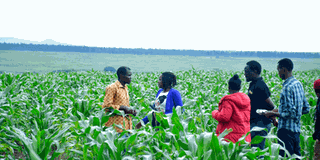Smallholder farmers get empowered

A farmer explains how he grows maize for export at his farm in Pakanyi Sub-county, Masindi District. photo by Edgar r Batte
“It’s hard to detect good luck - it looks so much like something you’ve earned,” wrote American politician, Frank Clark.
When the Agilis Partners, an agricultural company was planning to set up in Masindi District in December 2012, Erivaid Kugonza was the first farmer they came in contact with.
Kugonza is a hardworking woman. On that morning, she was going to harvest grass for her cattle. On her way, she found a number of White people in Masindi Town.
Curious, she asked them what they were looking for. They were looking for five model farmers. She became one of their focal people who helped them identify the other farmers.
According to the partners, they joined the agricultural sector after helping an orphanage build a pig farm. The pigs were eating so much maize, and they could not get reliable quality at low prices.
As such, they found the agricultural industry intriguing for social impact as a major opportunity to impact lives because of the massive involvement in the sector.
Then, there was a large addressable market hinged on the prospect that if East Africa does not produce its own food, it will be dependent on outside countries. Kugonza’s home became their station point. When the partners sought for a name for the farm they were to set up, they asked her to identify a name.
She sought advice from one of the district personnel, who told her to give them a name of one of her grandchildren.
That is how the farm was named after Asili, one of Kugonza’s granddaughters, now in her Primary Four.
“They started training us in modern farming practices with focus on maize growing. They later on connected us to dfcu Bank in order to boost our capacity levels. They provided us ready market for the maize,” she recalls.
One of the goals of the Agilis Partners is unleashing human potential, nourishing families through an efficient food system and impact generations through massive scale and sustainability.
The following year, Kugonza says maize was grown on a large scale and prices fell drastically. A kilogramme of maize fetched as low as Shs300, which led many farmers to opt or take a break from growing the grain.
That could have contributed to the Agilis Partners to ponder growing the crop to feed into the commercial chain.
In 2013, they started building a grain business while volunteering for an orphanage and primary school in Uganda.
They rent land and Kugonza, a resident of Kyarumbeyiha, is one of the beneficiaries, earning Shs100,000 per season for an acre of land on which they grow maize. The Agilis Partners handle grain aggregation and distribution through grain collection centres across western Uganda.
They work in partnership with Joseph Initiative, a grain trading business and smallholder farmer agricultural services business.
“We have knowledge. We know how to farm land and maximise yield. We transfer this knowledge to farmers,” explains Philip Prinz, the Managing Director of Joseph Initiative and Principal at Agilis Partners.
He made the remarks during a farmers’ field day organised at their farm in Kigumba last week.


